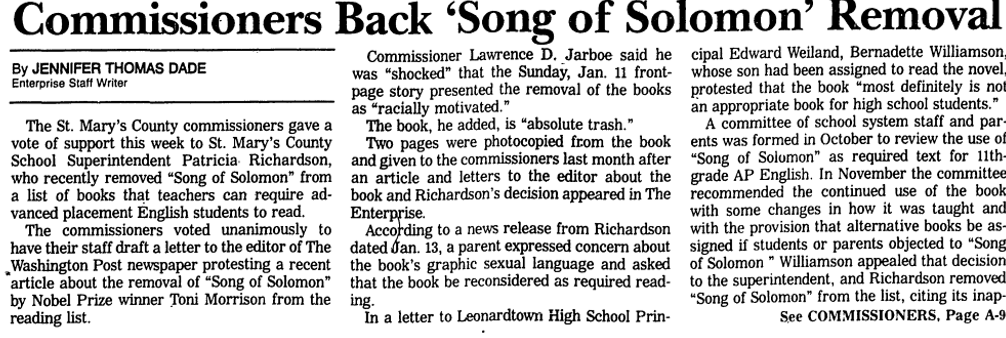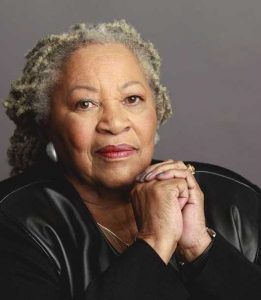The Commissioner
This article sums up the Commissioners support of banning Song of Solomon. The Commissioner was shocked by the pages read. This also sums up previous letters to the editor.
Dade, Jennifer. “Commissioners Back ‘Song of Solomon’ Removal” The Enterprise, January 16, 1998.
(“COMMISSIONERS BACK ‘SONG OF SOLOMON’ REMOVAL” The St. Mary’s County commissioners gave a vote of support this week to St. Mary’s County School Superintendent Patricia Richardson, who recently removed ‘Song of Solomon’ from a list of books that teachers can require advanced placement English students to read. The commissioners voted unanimously to have their staff draft a letter to the editor of The Washington Post newspaper protesting a recent article about the removal of ‘Song of Solomon’ by Nobel Prize winner Toni Morrison from the reading list. Commissioner Lawrence D. Jarboe said he was “shocked” that Sunday, Jan. 11 front-page story presented the removal of the books as ‘racially motivated.’ The book, he added, is ‘absolute trash.’ Two pages were photocopied from the book and given to the commissioners last month after an article and letters to the editor about the book and Richardson’s decision appeared in The Enterprise. According to a news release from Richardson dated Jan. 13, a parent expressed concern about the book’s graphic sexual language and asked that the book be reconsidered as required reading. In a letter to Leonardtown High School Principal Edward Weiland, Bernadette Williamson, whose son had been assigned to read the novel, protested that the book ‘most definitely is not an appropriate book for high school students.’ A committee of school system staff and parents was formed in October to review the use of ‘Song of Solomon’ as required text for 11th-grade AP English. In November the committee recommended the continued use of the book with some changes in how it was taught and with the provision that alternative books be assigned if students or parents objected to ‘Song of Solomon’ Williamson appealed that decision to the superintendent, and Richardson removed ‘Song of Solomon’ from the list, citing its inap-)
(propriateness. ‘The students participating in the class and typically 15 and 16 years old, and are considered as minors, unlike college freshman who are generally 18 or older,’ the Jan. 13 press release says. Advanced placement English classes are intended to cover the same material and demand the same work from students as college freshman classes. ‘Song of Solomon’ is widely used in college classes and high school advanced placement classes. The book, about a young middle-class African-American man and his family in Michigan, was published in 1977. It won the National Book Critics Circle Award that year. In 1993 Morrison was awarded the Nobel Prize for literature for the body of her work. Responding this week to an e-mail request, Bo Svensen, private secretary of the permanent secretary of the Swedish Academy which awards the prize, forwarded the official prize motivation: ‘Toni Morrison, who in novels characterized by visionary force and poetic import, gives life to an essential aspect of American reality.’ She has just published a new novel, ‘Paradise,’ which has triggered a new round of interest in Morrison and her work. This week she appears on the cover of Time magazine. The concerns expressed by parents and others in St. Mary’s County in letters and other comments have focused on the sexually explicit nature of some of the language appropriateness as a text for high school students. One letter writer did argue that the book ‘may be fairly well written but great literature it is not’ and said the book’s ‘merits and educational value are minimal.’ However the Post article also raises questions of racial motivation in the book’s removal, Jarboe said. ‘I didn’t interpret (the Post article) that way at all,’ said Commissioner Paul W. Chesser, who voted in favor of the letter anyway because he felt the book was not appropriate for 11th-graders. ‘My objection was that it was made to be compulsory reading… to an audience too young to evaluate its literary value,’ he said. ‘We don’t have to add to problems with sexual values.’ Commission President Barbara R. Thompson said that the two pages she read were so offensive that she not only threw them away, but tore them up so that no one else could read them. None of the commissioners indicated they had read the book. The two pages passed along to them by Richardson were among the most graphic in the book. The book remains available in the three county public high school libraries for students who want to read it, school officials said. The elected members of the school board have made no public comment on the matter.)







